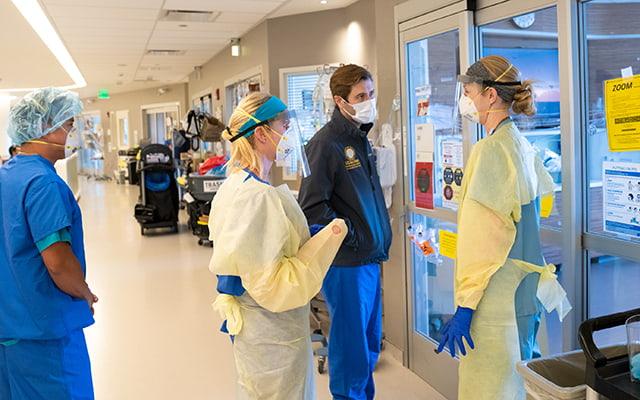Clinicians, researchers, patients and the general public are invited to submit questions that could be answered by COVID-19 patient medical record data from 200+ hospitals

Credit: UC San Diego Health Sciences
As the COVID-19 pandemic continues, there is an urgent need to determine who is at greatest risk for severe disease, better understand how the disease and treatments evolve, and predict the need for resources. But to get there, researchers and clinicians need more data about what patients have experienced so far, and what factors are associated with different patient outcomes.
To provide this information, a new research consortium invites clinicians, researchers, patients and the general public to submit questions that could be answered by COVID-19 patient record data from more than 200 participating hospitals. Questions are submitted and answers are provided via a new web portal: COVID19questions.org.
The consortium, called Reliable Response Data Discovery (R2D2), is led by Lucila Ohno-Machado, MD, PhD, chair of the Department of Biomedical Informatics at UC San Diego Health, and made possible by seed funding from the Gordon and Betty Moore Foundation. R2D2 comprises 12 health systems (202 hospitals) to date: UC San Diego Health, Cedars Sinai Medical Center, Ludwig Maximilian University of Munich, San Mateo Medical Center, UC Davis Health, UC Irvine, UCLA, UCSF, University of Colorado Anschutz Medical Campus, University of Southern California, University of Texas Health Science Center at Houston and Memorial Hermann Health System, and the Veterans Affairs (VA) Healthcare System.
“No single hospital alone has treated enough patients with COVID-19 to be able to see reliable patterns emerge, and use that information to guide the direction of new studies,” Ohno-Machado said. “That’s why we formed the R2D2 Consortium.”
Unlike other patient databases and registries, the R2D2 COVID-19 Questions site allows health systems to maintain control of their own data rather than pool it in a central repository. No patient-level data are ever transmitted outside of each health system, only data aggregates, and the privacy of individuals and institutions is preserved. Through advanced computational methods, complex analyses involving multiple factors can be performed. Since the system queries all patient records, not just those with COVID-19, users can ask questions about how patients with COVID-19 compare to other patients.
Here’s how the site works: Users submit questions about adults hospitalized with COVID-19. Consortium team members evaluate the submissions for clinical utility and likelihood that available data can provide answers. Questions are then translated into a computer code that queries a variety of electronic medical records in a way that will deliver reproducible results — an “apples to apples” comparison, as Ohno-Machado puts it. Each health system runs the code on their own patient records and provides the results to the consortium. When sufficient results accrue to be statistically meaningful, the answers are posted back to covid19questions.org — not as definitive conclusions, but as data in the form of charts or other graphics, which researchers can further pursue.
Among the questions already asked and answered:
- Among adults hospitalized with COVID-19 and a history of hypertension, what is the mortality rate for those who received anti-hypertensive medications?
- Many adult COVID-19 patients who were hospitalized did not get admitted to the intensive care unit (ICU) and were discharged alive. Of those, how many returned to the hospital within a week?
- Among adults hospitalized with COVID-19, how does the in-hospital mortality rate compare between those who received glucocorticoids and those who didn’t? How does that differ by age, ethnicity, gender and race?
The COVID-19 Questions site can draw from data on more than 45 million patients, including more than 59,000 who tested positive for COVID-19 and 29,000 who were hospitalized with the infection. To position the data to best reflect U.S. demographics, the R2D2 Consortium made a point of diversifying the patient population by including not only academic health systems in wealthy metropolitan areas, but also small community hospitals, safety net hospitals and the VA.
As additional health systems around the world join the consortium, Ohno-Machado said the data available will become more diverse and robust, and the team will be able to answer more questions, more efficiently.
“The scientific community has talked about using electronic medical records for guiding research and for answering relevant questions for a long time,” Ohno-Machado said. “But until now we haven’t been doing it in a way that the public can see — this is much different than when only scientists can ask questions and publish their findings in academic journals.”
###
Media Contact
Heather Buschman, PhD
[email protected]




